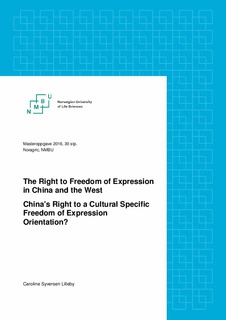| dc.contributor.advisor | Sverdrup-Thygeson, Bjørnar | |
| dc.contributor.author | Lilleby, Caroline Syversen | |
| dc.date.accessioned | 2017-04-03T14:48:05Z | |
| dc.date.available | 2017-04-03T14:48:05Z | |
| dc.date.issued | 2017-04-03 | |
| dc.identifier.uri | http://hdl.handle.net/11250/2436642 | |
| dc.description.abstract | Freedom of expression is one of the most sensitive and intensively discussed issues between China and the UN today. The UN´s criticism of China´s freedom of expression orientation is embedded in a universalist understanding and conflicts with the cultural relativistic position China takes over the same rights. China and cultural relativists argue that the cultural, historical and political particularities of a state impact human rights orientation and by such, never can be universal.
Given the differences between China and UN´s understanding of freedom of expression, this thesis analysis how China´s history, politics and culture shape its current freedom of expression orientation. This analysis aims to explore whether or not China´s freedom of expression orientation can be justified on the argument of historical, cultural and political particularities.
My thesis concludes that these particularities have a limited effect. By implementing Fairclough´s model of critical discourse analysis, I have analyzed the relationship between text and its social context, being UPR documents and the particularities of Chinese history. My analysis demonstrates that the relationship that exists takes on a hidden agenda as the CCP uses Chinese particularities to promote self-interests. | |
| dc.language.iso | eng | nb_NO |
| dc.publisher | Norwegian University of Life Sciences, Ås | |
| dc.title | The right to freedom of expression in China and the West : China's right to a cultural specific freedom of expression orientation? | nb_NO |
| dc.type | Master thesis | nb_NO |
| dc.source.pagenumber | 74 | nb_NO |
